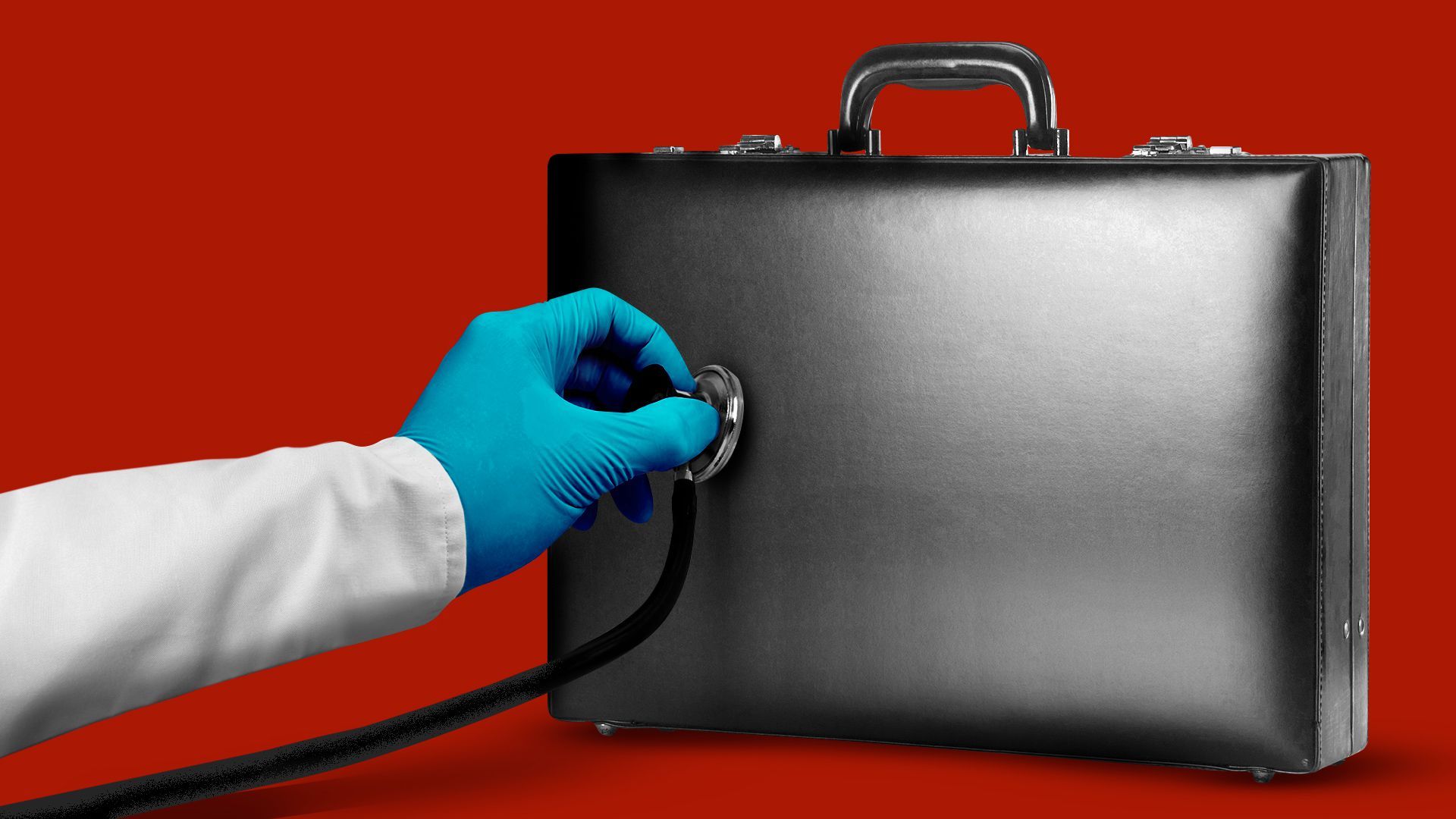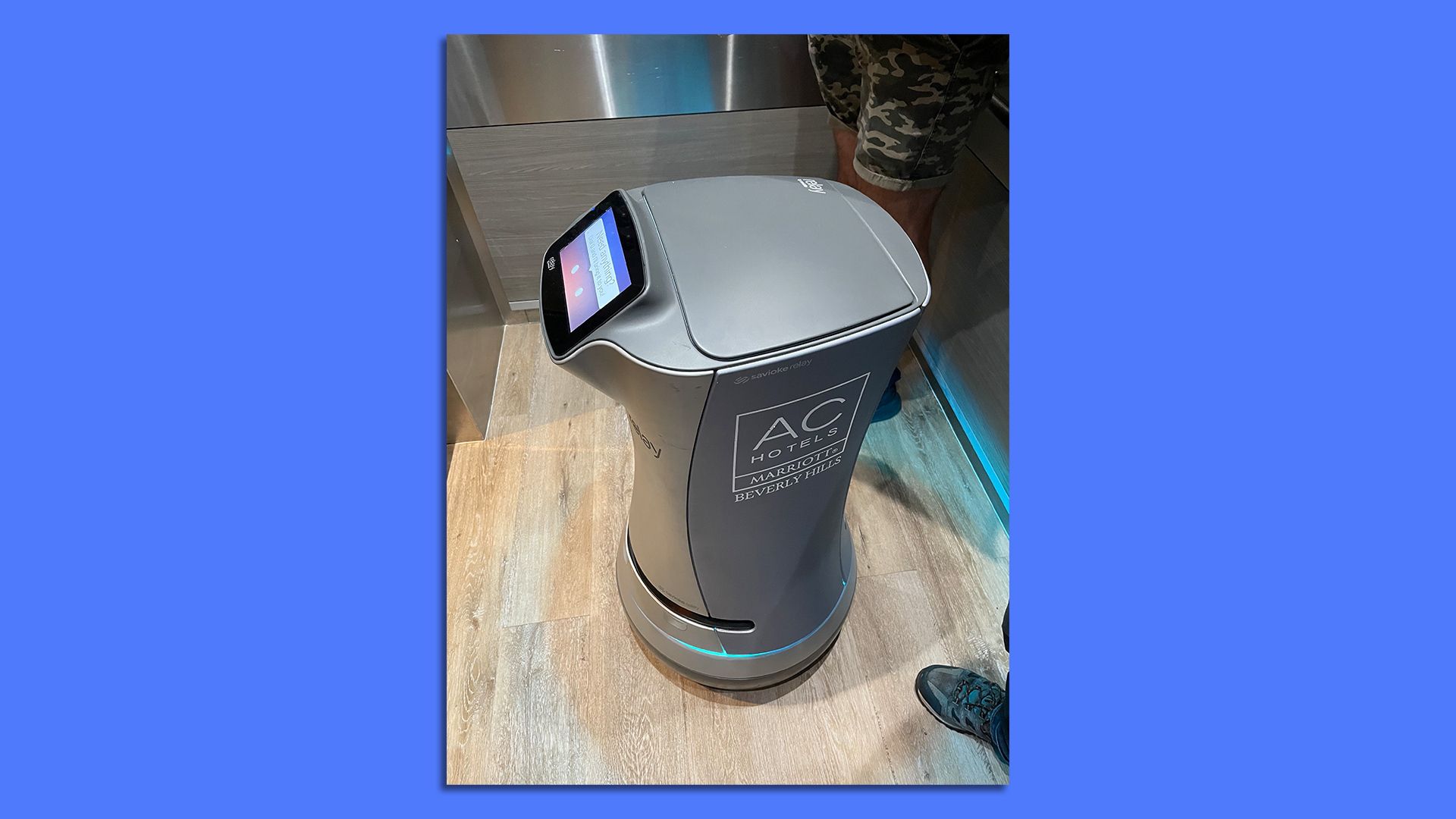| |
| |
| |
| Presented By BigSpring |
| |
| Axios What's Next |
| By Jennifer A. Kingson and Joann Muller · May 09, 2022 |
| We hope you had a good Mother's Day! If you received an NFT as a gift, you're in luck: Nobody has figured out how to collect sales tax on it — yet. - Also today: Cute little robots are delivering toiletries to people's hotel rooms.
- Have you seen a robot doing something eye-catching or weird? Send us a picture of it: Whatsnext@axios.com.
Today's Smart Brevity count: 1,059 words ... 4 minutes. |
| |
| |
| 1 big thing: How do you tax NFTs? States are in a quandary |
 |
|
| Illustration: Eniola Odetunde/Axios |
| |
| Is a non-fungible token a piece of property? Is it tangible? Tax authorities are grappling with these and other questions as they start to set policy on the sale and transfer of NFTs, Jennifer A. Kingson writes. Why it matters: NFTs are being bought and sold for huge sums — the $69 million Beeple is an anomaly, but symbolically important — and federal and state revenue departments want to get their due shares. - But the fact that NFTs can take many forms — physical and digital — and be sold in nontraditional ways place them outside the scope of current tax codes.
- So states are losing out: "At least 31 states apply sales taxes to digital products and services, but few if any tax dollars are flowing to them from the hottest commodity in the digital economy," NFTs, reports Bloomberg Tax.
Driving the news: Washington state and Puerto Rico are poised to become the first two jurisdictions to issue guidance on how NFTs should be taxed. - Both take the position that NFTs are subject to sales taxes, despite the sometimes nebulous nature of a token's underlying product.
- Other jurisdictions are likely to eye the rules they lay down for guidance.
- "Puerto Rico's regulation gives me hope that even states with a really broad definition of digital goods will acknowledge that NFTs may not fit squarely into the existing rules," Grace Kyne, a senior tax manager in the Boston office of EY LLP, tells Bloomberg Tax.
Where it stands: The IRS hasn't addressed the taxation of NFTs in any of its guidance on cryptocurrency (or elsewhere). This has left state tax officials — not to mention private accountants — at a loss. - "The problem is, NFTs act like tax code shapeshifters," says Route Fifty, a news website that reports on state and local government issues. "Sometimes it's tangible property, sometimes it's a video, other times it's admission to a private event. And sometimes it's a combination of things."
- A spokeswoman for Washington state's Department of Revenue told Route Fifty that its advisory on NFTs "will address sales and use tax and business and occupation taxes, and that it may later address capital gains taxes."
Keep reading. |
    |
| |
| |
| 2. The rise of health-related travel benefits |
 |
|
| Illustration: Aïda Amer/Axios |
| |
| Employers that reimburse workers who travel for reproductive care may be a response to the current political climate, but it's only the latest way in which they're adding medical travel to their list of benefits, Caitlin Owens writes in Axios Vitals. The big picture: Rising health care costs drove employers to design policies that make cheaper or higher-quality services accessible long before the wave of red-state abortion restrictions. - The rise of remote work brought on by the pandemic, the shuttering of rural health services and the advent of complicated new health technologies may drive more employers to pay for workers to receive care that's far from home.
Driving the news: Amazon is among the latest employers to announce that it will reimburse employees for travel connected with accessing abortions. - But Amazon's policy isn't limited just to reproductive care — it applies generally to non-life-threatening treatments, like cardiology, gene therapies and substance use disorder services, Reuters reports.
- The benefit applies if a service is not available within 100 miles of an employee's home and virtual care isn't an option.
Reality check: Medical travel benefits may be making political waves, but they're not new. In fact, some employers have designed benefits that encourage workers to leave home for care, either because of cost or quality. Read the full story. |
    |
| |
| |
| 3. The EV surge is gathering steam |
 Data: ACEA; Chart: Simran Parwani/Axios Newly released data shows a big jump in European and U.S. electric vehicle sales, Ben Geman writes in Axios Generate. Driving the news: The European Automobile Manufacturers' Association reports that fully electric cars were 10% of sales last quarter, nearly twice the level from the same stretch in 2021. Plug-in hybrids were almost 9% of the market in Q1, as you can see above. Meanwhile, new U.S. data from the Alliance for Automotive Innovation shows that EV sales have climbed here too, albeit from a lower level. - The main U.S. industry trade group reports that electric vehicles were 4.52% of sales last month, roughly double where they were a year prior.
- Plug-in hybrids were another 1.31% in April.
|
    |
| |
| |
| A message from BigSpring |
| Support for digital journalism |
| |
 |
| |
| Journalists in emerging digital markets don't always have access to effective training. That's why Facebook uses BigSpring to provide journalists with the product skills they need. The impact: More people around the world can access relevant news through Facebook. Learn more. |
| |
| |
| 4. Ghosting your employer |
 |
|
| Illustration: Brendan Lynch/Axios |
| |
| It's one thing to ghost a bad date, an old flame or a classmate hitting you up for an alumni donation. But these days, people are actually ignoring entreaties from companies that have hired them for decent-paying jobs, the Wall Street Journal reports. - The most galling part: People are not even showing up for work on the first day!
Why it matters: As the jobs boom continues, employers who are creating jobs and trying to fill existing ones will continue to be plagued by indifference from the generation that's responsible for the Great Resignation. Driving the news: "Manufacturers, restaurants, airlines and cleaning companies are among the employers seeing a surge of job seekers who accept positions — and are neither seen nor heard from again," according to the Journal. - "Southwest Airlines Co. said some 15% to 20% of new hires for some jobs don't turn up on their first day."
The practice is "often called ghosting" and "isn't new," according to the paper: - "In the tight labor market that preceded the pandemic, employers reported that some staffers quit without giving notice or just stopped showing up for their shifts. The practice picked up its own shorthand: 'no call, no show.'"
What's different now: "More people are vanishing before even starting a job." What they're saying: "Candidates have so many options in this market that typical professional etiquette is being ignored," Keith Wolf, a managing director at the recruiting firm Murray Resources in Houston, tells the Journal. |
    |
| |
| |
| 5. The new face of room service |
 |
|
| The room service droid at the AC Hotel by Marriott Beverly Hills. Photo: Jennifer A. Kingson/Axios |
| |
| They're still a curiosity — but for how long? During a recent stay at a hotel in Los Angeles, Jennifer shared the elevator with this room service robot, which dutifully toted towels, toiletries and (overpriced) snacks from the lobby to guests' rooms. - The goods get stowed in the belly of the bot.
- The unit is made by Relay Robotics, which boasts that it can "call and ride elevators independently and make deliveries in 10 minutes or less."
- The best part: It doesn't expect a tip.
What's next: All current trends — from the U.S. labor shortage to our COVID-era preference for contact-free service — point toward droids like these becoming commonplace and ubiquitous. |
    |
| |
| |
| A message from BigSpring |
| The tools journalists need |
| |
 |
| |
| Facebook, the world's largest news aggregator, is providing journalists in emerging digital markets with training through BigSpring. Why it's important: Many journalists in these markets don't have the tools they need to cover news effectively. Learn more. |
| |
| Was this email forwarded to you? Get your daily dose of What's Next magic by signing up for our free newsletter here. |
 | It's called Smart Brevity®. Over 200 orgs use it — in a tool called Axios HQ — to drive productivity with clearer workplace communications. | | |









No comments:
Post a Comment